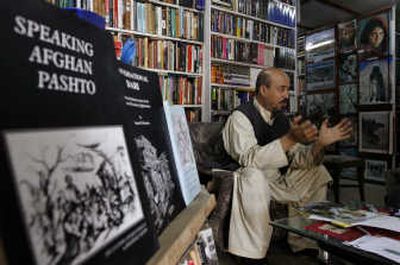‘Bookseller’ pens response to novel

KABUL, Afghanistan – The famed bookseller of Kabul – whose family life was chronicled by a Norwegian journalist – has published a scathing response to that best-selling book, accusing the author of creating lies about him and abusing his hospitality and friendship.
Shah Mohammad Rais welcomed journalist Asne Seierstad into his crowded four-room home in February 2002, shortly after the U.S.-led invasion of Afghanistan toppled the hardline Taliban regime.
Rais says that Seierstad’s resulting 2003 best seller, “The Bookseller of Kabul” – in which she dubs him “Sultan Khan” to protect his identity – was full of “concocted histories.” He has filed a lawsuit against Seierstad in Norway over the book.
“When I read the book, I was terribly shocked,” the 53-year-old bookseller said in accented English during an interview at his jam-packed shop in central Kabul. “I found that she was not honest, she has lots of lies and she misused hospitality, the sense of friendship.”
Before moving in, Seierstad told the family of her intention to write a book about what she witnessed and heard living with them, but Rais says she violated their trust by disclosing stories told to her in confidence – a claim Seierstad disputes.
“I was not a guest in the house secretly writing a book after having listened to private conversations. I was there as a journalist, with my notebook, my computer, my satellite phone,” the 37-year-old Seierstad wrote in an e-mail from Oslo.
“I did formal interviews with everyone in the house, and Shah Mohammad Rais himself translated several of the interviews, and told me his own story.”
“The Bookseller of Kabul” became a huge hit in Norway and abroad, providing an intimate portrait of Rais’ family life. It tells of the troubles and imprisonment he suffered to keep his bookstore open under the Taliban, but depicts him as a tyrant at home.
Although Seierstad gave Rais an alias in the book, most educated Kabulis were easily able to pinpoint him as the real Sultan Khan, as he is a well-known figure here.
Rais has penned his own book in response to Seierstad’s portrayal of him. “Once Upon a Time There Was a Bookseller in Kabul,” originally written in a mixture of broken English and Persian, was published last year in Norwegian. Another 25,000 copies, translated in Portuguese, were sold in Brazil, he said.
The all-English version was printed in August and is available only in his shop, though he plans to meet soon with European publishers to have it printed and distributed abroad.
In his tale, two hairy Norwegian trolls visit him on a fact-finding mission to discover the truth about the bookseller and to hear his version of Seierstad’s story.
He confesses to the trolls that he did not really want to host Seierstad in his home, which at the time was crowded with 20 people, but he could not turn her down.
“It was more or less impossible for me to have guests at the time, but the Afghani culture and rules of hospitality tells us that the guest is God’s friend. Thus it was extremely difficult to say no,” Rais writes.
But he says his “generosity and kindness is rewarded with slander” as Seierstad makes “an innocent family’s private problems public.”
He complains that Seierstad wrote that he denied members of his family education, but he defends his family as among the best educated in Afghanistan.
She writes that orders were barked at Rais’ youngest sister, dubbed “Leila,” which he calls “pure invention.”
“Every time she made tea, or went to fetch a glass of water, she simply acted as a loving sister who cared deeply for her older brother or her mother,” Rais writes.
He also takes offense with Seierstad’s claims that he locked up fruit for his favored second wife.
“She destroyed my family,” Rais said, claiming that both his wives and a few of his children are now living in Norway and Canada in part because of Seierstad’s book.
“Many stories in the book are very unacceptable in this society. Many people blame me.”
More than anything, Rais writes at the end of his book, he wants Seierstad to ask forgiveness for committing an “injustice to an innocent family.”
Says Seierstad: “I wrote my book, he wrote his, that is fine, and the reader can judge.”